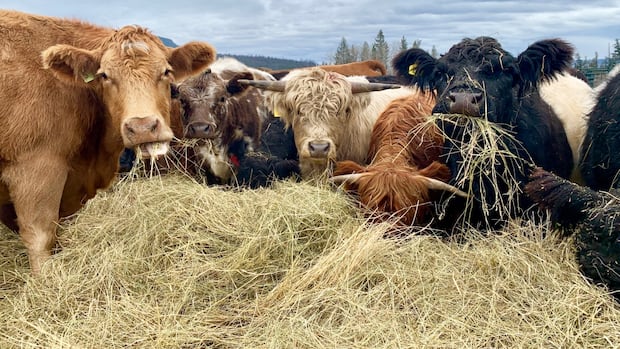British ColumbiaB.C. beef farmers have been caught in the middle of an ongoing public service labour dispute — as the inspectors that are mandated to be at slaughterhouses are on strike. But the union says the inspectors are underpaid and not designated as essential workers.B.C. General Employees’ Union didn’t intend to disrupt slaughterhouse inspectors, but says they’re underpaidAkshay Kulkarni · CBC News · Posted: Sep 11, 2025 2:22 AM EDT | Last Updated: 4 hours agoCows are pictured eating at the Hanceville Cattle Company’s farm just outside Williams Lake, B.C. Cattle ranchers at the farm are among those in B.C. getting caught up in a public service workers’ strike. (Submitted by Hanceville Cattle Company)B.C. beef farmers and ranchers say they’re caught in the middle of an ongoing public service labour dispute — as the inspectors that are mandated to be at slaughterhouses are on strike.The B.C. General Employees’ Union says thousands of public service workers have joined picket lines since their strike action began on Sept. 2, as they continue to seek higher wages from the provincial government.Among those workers are meat inspectors, who are required to be at licensed slaughterhouses if a small beef farm wants to sell its product within the province.Ranchers say the strike could cause a major hit to their bottom line.One rancher in the Chilcotin region says that abattoir inspectors should have been classified as an essential service and exempted from strike activity.Radio WestB.C. Cattlemen’s Association calls on province to reinstate meat inspection services amid public sector service strikeRandy Jones is a rancher and the general manager of the Hanceville Cattle Company. He says he cannot process his meat due to job action due to BCGEU labour dispute”It kind of crept up on us really fast. We were unaware that this was going to be an issue,” said Randy Jones, the general manager of the Hanceville Cattle Company just outside Williams Lake, B.C.”On Monday, we were actually hauling live cattle to our abattoir for processing,” he added. “And word came down … that they were not able to have an inspector present as they normally do, which meant that the processing could not happen.”Randy Jones, general manager of the Hanceville Cattle Company, says that it’s likely only smaller ranchers are caught up in the public service strike. (Submitted by Hanceville Cattle Company)Jones said that his farm, which has existing relationships with consumers and delivers beef every few weeks, would likely take be affected if the strike drags on.”We are into our fall season, which is actually a really busy time for the markets and our beef and whatnot,” Jones told Sarah Penton, host of CBC’s Radio West.”So it’s a bit of a bummer … to be kind of facing this right now ’cause it wasn’t really something that we had thought for the million years would be [an] issue.”WATCH | BCGEU escalates strike action: BCGEU escalates job action across B.C.The B.C. General Employees’ Union is ramping up its job action, rolling out new actions in more cities in B.C. As Johna Baylon reports, the union says the targeted job action has meant the public hasn’t felt the impact so far, but say that may change.He also says that it’s likely only smaller beef producers like Hanceville will be affected — as larger beef producers and retailers go to abattoirs staffed by federally-regulated inspectors, not ones that are part of the BCGEU.The B.C. government says that slaughter establishments are either federally registered or provincially regulated.Meat processed at provincial facilities are only permitted to be sold within B.C., while products processed at federal facilities can be exported outside the province.Galloway cows are seen on the Hanceville Cattle Company farm in the Chilcotin region. The small ranch sells products directly to consumers through farmers’ markets and direct sales. (Submitted by Hanceville Cattle Company)BCGEU caught off guard, president saysBCGEU President Paul Finch told CBC News that slaughterhouse inspectors weren’t intentionally part of the job action, and the union was now researching the issue.”We’ve taken some some care to try and, at this phase of the strike, insulate the broader public from some of the impacts,” he told CBC News.”We didn’t intend to take out this group [of workers].”BCGEU President Paul Finch says that it wasn’t the union’s intention to target meat processing facilities as part of their job action. (Ben Nelms/CBC)Finch says that what appears to have happened was that slaughterhouse inspectors weren’t designated as essential workers, and that they were therefore mandated to join picket lines at a Kamloops, B.C., location when they went up.He said that, even as the union continues to look at the issue of striking slaughterhouse inspectors, the core issue at the heart of the strike remained, and the province hadn’t come back to the table with a good enough offer.”There is an issue with [provincial] meat inspectors, where they’re underpaid compared to their federal counterparts who actually … perform the same function,” he argued.B.C. Agriculture Minister Lana Popham said the government was now moving to designate meat inspectors as essential workers. (Hunter Soo/CBC)B.C. Agriculture Minister Lana Popham said in a statement on Wednesday evening that the province was now working to make meat inspection a designated, essential service.”We are working to ensure that proactive measures are taken as needed so B.C. abattoirs can keep their businesses open if, and when, they are affected by labour disruption,” she said.”The ministry is also providing additional guidelines to abattoir operators highlighting food safety and animal welfare requirements that continue to apply under these unique circumstances.”WATCH | How the BCGEU strike could impact other unions: How BCGEU job action could impact other unions’ contract negotiations As the B.C. General Employees Union escalates job action this week, labour experts say it could be setting the tone for other public sector unions with impending contraction renegotiations. Daniel Reeve, a Camosun College political scientist, says the provincial government is having to walk a fine line between its labour roots and B.C.’s current financial situation. ABOUT THE AUTHORAkshay Kulkarni is an award-winning journalist who has worked at CBC British Columbia since 2021. Based in Vancouver, he is most interested in data-driven stories. You can email him at akshay.kulkarni@cbc.ca.With files from Sarah Penton, Johna Baylon and Radio West
B.C. beef farmers say they’re caught in the middle of a public service strike











